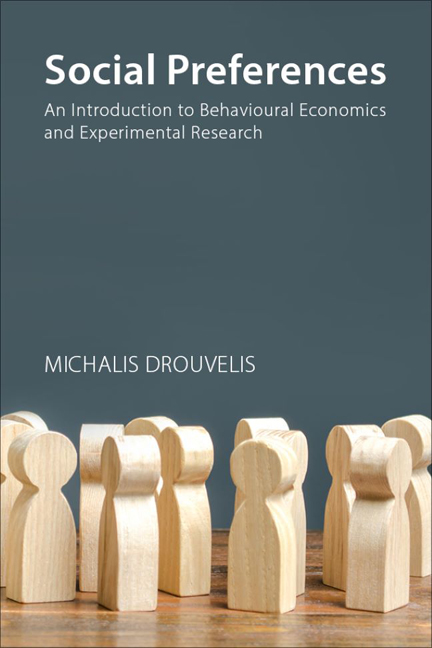Book contents
- Frontmatter
- Contents
- Preface
- 1 Introduction
- 2 Bargaining games
- 3 Trust and gift exchange games
- 4 Public Good Games I
- 5 Public Good Games II
- 6 Leadership
- 7 Public good games with sanctioning I
- 8 Public good games with sanctioning II
- 9 Cross-cultural experiments
- Appendix A Experimental instructions
- Appendix B Practical information
- Notes
- References
- Index
Appendix A - Experimental instructions
Published online by Cambridge University Press: 22 December 2023
- Frontmatter
- Contents
- Preface
- 1 Introduction
- 2 Bargaining games
- 3 Trust and gift exchange games
- 4 Public Good Games I
- 5 Public Good Games II
- 6 Leadership
- 7 Public good games with sanctioning I
- 8 Public good games with sanctioning II
- 9 Cross-cultural experiments
- Appendix A Experimental instructions
- Appendix B Practical information
- Notes
- References
- Index
Summary
In this Appendix, we provide sample instructions about the key experimental games measuring aspects of social preferences as covered in the previous chapters of this book. Specifically, the instructions relate to ultimatum games (Section A.1), dictator games (Section A.2), trust games (Section A.3), simultaneous public good games (Section A.4), sequential public good games (Section A.5), public good games with punishment (Section A.6) and public good games with third-party punishment (Section A.7). For the public good game instructions (Sections A.4, A.5 and A.6), we also include instructions for belief elicitation which can be easily adapted and used for other experimental games.
The provided set of instructions can be a useful tool for instructors to run classroom experiments, students who may want to conduct their own experiments for their dissertations and/or assessed components in a behavioural economics module (e.g. group projects and presentations) and academics who would like to run relevant experiments for their research. The corresponding parameters specified (e.g. amount/endowment to be divided, group size, number of periods) can be straightforwardly adjusted depending on the nature of the experiment.
Instructions for the ultimatum game
Instructions for proposers
Welcome to this study of decision-making. The instructions are simple, and if you follow them carefully, you can earn a considerable amount of money. In this experiment, you have been assigned the role of “Participant A”. You have been randomly matched with another participant who will be in the role of “Participant B”. Your earnings will depend on your decisions as well as on the decisions of Participant B. At no point during the experiment, nor afterwards will you be informed about the identity of the other participants in your group and the other participants will never be informed about your identity.
You will be asked to propose a split of a total of 10 Pounds between yourself and Participant B. In particular, you will make an offer to Participant B that specifies how much of the 10 Pounds you will receive and how much of the 10 Pounds he/she will receive.
The amount that your offer specifies for yourself can be anything from 0 to 10 Pounds. Your earnings in the experiment will depend on whether or not Participant B accepts your offer. If he/she accepts your offer, both you and Participant B receive the amounts specified in your (accepted) offer
- Type
- Chapter
- Information
- Social PreferencesAn Introduction to Behavioural Economics and Experimental Research, pp. 147 - 162Publisher: Agenda PublishingPrint publication year: 2021

